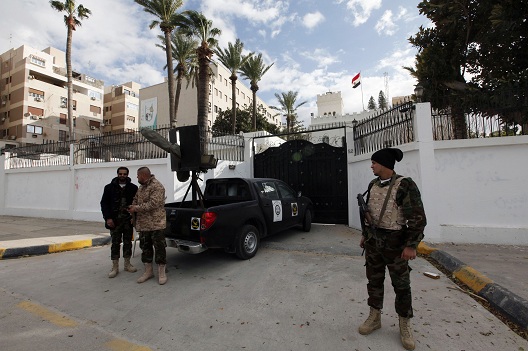 As was discussed in the first part of this article, Cairo has several choices to consider when determining how to deal with the Libyan crisis, which continues to deteriorate on Egypt’s western border. Among the options available to Cairo are: direct military intervention, either unilaterally or jointly with other parties; indirect military intervention, either unilaterally or jointly with other parties; or sufficing with preventive measures which do not consist of direct intervention.
As was discussed in the first part of this article, Cairo has several choices to consider when determining how to deal with the Libyan crisis, which continues to deteriorate on Egypt’s western border. Among the options available to Cairo are: direct military intervention, either unilaterally or jointly with other parties; indirect military intervention, either unilaterally or jointly with other parties; or sufficing with preventive measures which do not consist of direct intervention.
A Limited Military Incursion
With a direct and full military invasion previously discussed, the second scenario for direct, unilateral military intervention by Egypt would, in short, consist of a deep incursion by Egyptian forces to allow for the creation of a secure corridor within Libyan territory along the Egyptian border. This scenario would fundamentally depend on transferring the confrontation in its entirety to the Libyan interior. Even so, such an incursion would remain much more limited than the scenario of a full invasion.
Such a deep incursion would presumably be focused exclusively on eastern Libya, as this is the most heated area of fighting and represents the main stronghold of takfiri militias. Under this scenario, the Egyptian military would be able to avoid the negative repercussions of engaging in a multilateral tribal confrontation by working to neutralize the tribal element and focusing exclusively on confronting takfiri militias.
The only guaranteed outcome of this scenario would be the end of weapons smuggling and infiltration of extremists across Egypt’s porous western border. However, the negative repercussions of such a scenario would not significantly differ from those of a full-scale invasion: ultimately, such an incursion would be seen internationally as an invasion of a sovereign state and reacted to as such. This would likely entail economic sanctions, international isolation, and potentially even a direct confrontation with major powers seeking to preserve their interests in Libya.
What is even worse is the fact that it is impossible to predict a clear timeframe for ending such an operation. Indeed, Egyptian forces could remain positioned throughout eastern Libya for an extended period of time. In the long-term, this could allow for members of these forces to be targeted, as happened to Israel in southern Lebanon from 1982 to 2000.
A Surgical Operation
The third scenario for direct military intervention is what is known in practical terms as a “surgical operation,” according to which Egyptian decision makers would resort to conducting targeted airstrikes against select targets. Such an operation could be accompanied by limited land operations, or this scenario could be limited to air attacks aimed at consolidating groups supportive of the Egyptian regime.
Under this scenario, the most that Egypt could hope to accomplish is preventing the advance of armed militias on the ground, cutting them off from their internal supply routes, weakening their forces, and crippling their abilities to attack the other party to the Libyan conflict. This presupposes that there is a nucleus of Libyan forces that Egypt could support in order to enable it to exert its influence across the country and regain control of the situation in Libya.
In terms of Egypt’s international obligations, this scenario would still fall under the framework of acts of aggression, unless the Libyan parliament or government were to officially request assistance in providing air cover for its forces in its war on terrorism. At this point, such a move appears difficult if not impossible, despite statements recently made by the Libyan prime minister in this regard.
The crisis over the struggle for legitimacy in Libya, in addition to the relatively equivalent levels of power displayed by most parties to the conflict, would make it difficult for any one of these parties to issue such a decision without fierce opposition from its opponents.
Upon reviewing the negative repercussions that would arise from such a decision, it appears highly unlikely that Cairo will resort to unilateral, direct military intervention according to any of the three scenarios described. Indeed, the experience of the Egyptian military in Yemen as well as that of Iraq after Saddam Hussein invaded Kuwait remain very present in the minds of Egyptian policymakers, and the lessons of these experiences cannot be ignored.
Nader Bakkar is a co-founder of Egypt’s al-Nour Party and serves as a member of the party’s presidential and foreign affairs committees, as well as the chairman’s assistant for media affairs.
Image: Photo: A general view of security in front of the Egyptian embassy in Tripoli January 25, 2014 (Reuters/Ismail Zeitouni)
